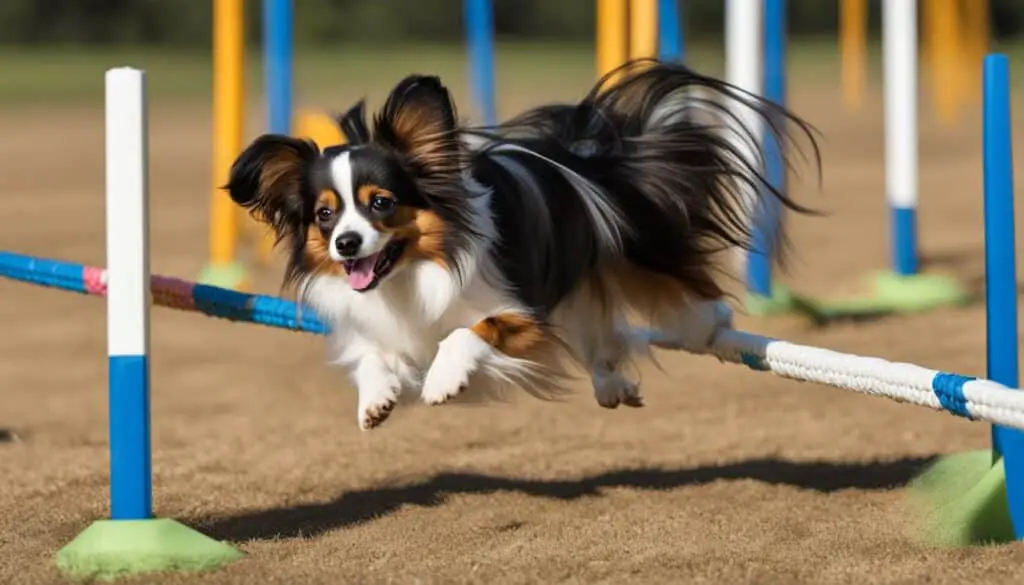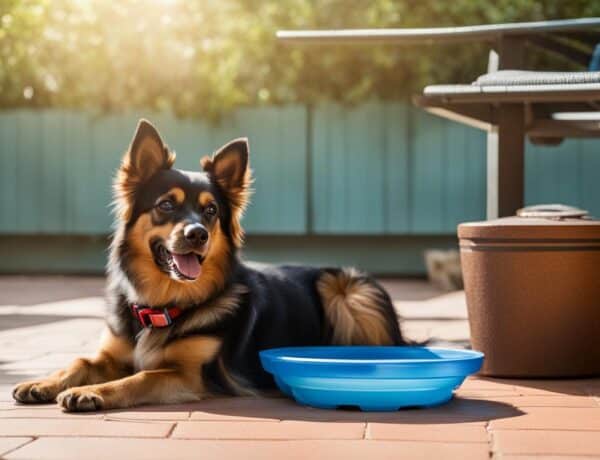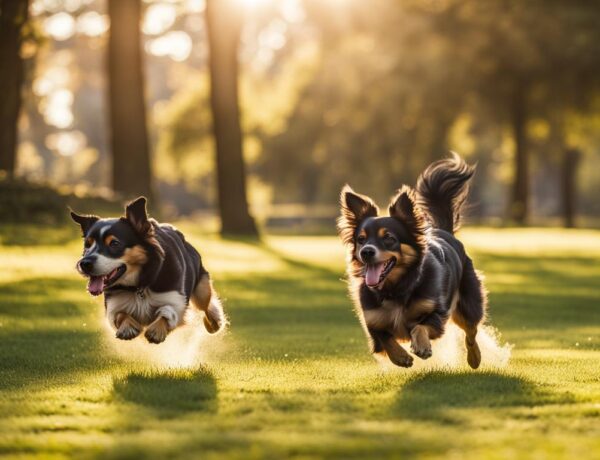The Papillon breed, known for its large butterfly-like ears, is highly intelligent and has remarkable cognitive abilities. Descended from toy breeds and spaniels, Papillons are known for their agility and obedience skills. They excel in competitions and have a sparkly personality that makes them a favorite among dog enthusiasts.
Despite their small size, Papillons are not lap dogs and require mental stimulation and regular exercise. They are highly active and playful, needing at least 30-60 minutes of exercise per day. Papillons are trainable, and their intelligent nature allows them to learn quickly through positive reinforcement. Their intelligence is showcased in various activities, including dog sports, tricks, and even movie roles.
Overall, the Papillon breed is celebrated for its intelligence and cognitive abilities.
Key Takeaways:
- The Papillon breed is highly intelligent and has remarkable cognitive abilities.
- Papillons excel in agility and obedience competitions.
- They are highly active and require regular exercise and mental stimulation.
- Papillons are trainable and learn quickly through positive reinforcement.
- Their intelligence is showcased in various activities, including dog sports and tricks.
The History and Characteristics of the Papillon Breed
The Papillon breed, also known as the butterfly dog, has a rich history dating back to the 16th century. Originating in France, they were originally called the Dwarf Spaniel or Continental Toy Spaniel. The Papillon is a small-sized breed, standing 8-11 inches tall and weighing 4-8 pounds.
One of the most distinctive features of Papillons is their long and silky coat, which requires regular grooming to prevent matting. Their coat is often compared to fluttering butterfly wings, hence the name Papillon, which means “butterfly” in French.
Aside from their physical appearance, Papillons are known for their playful and affectionate nature, making them excellent companions. Despite their small size, they have a big personality and are highly adaptable to different climates and settings. This adaptability, combined with their intelligence and trainability, has made them a popular choice for dog lovers worldwide.
However, it’s important to note that like all breeds, Papillons have specific health concerns that potential owners should be aware of. Some of the common health issues in Papillons include patellar luxation, progressive retinal atrophy, and dental problems. Regular vet check-ups and proper care can help mitigate and address these concerns, ensuring the well-being of these delightful dogs.
| Characteristics | Description |
|---|---|
| Size | 8-11 inches tall |
| Weight | 4-8 pounds |
| Coat | Long and silky |
| Temperament | Playful, affectionate, adaptable |
| Health Concerns | Patellar luxation, progressive retinal atrophy, dental problems |
Training and Care for Papillon Dogs
Proper training and care are essential for the well-being of Papillon dogs. With their high intelligence and eagerness to please, Papillons are highly trainable and excel in various activities. Positive reinforcement methods, such as treats and praise, work well with this breed and help to establish a strong bond between the dog and owner.
In terms of exercise, Papillons have moderate exercise needs compared to larger breeds. They require at least 30-60 minutes of physical activity per day to keep them mentally and physically stimulated. This can include walks, playtime, and interactive games. Regular exercise helps prevent behavioral issues and maintains their overall health and fitness.
Grooming is an important aspect of caring for a Papillon. Their long, silky coat requires regular brushing to prevent matting and tangles. It is recommended to brush their coat at least two to three times a week. Additionally, regular baths and nail trimming are needed to ensure their hygiene and overall well-being.
Papillons have specific health considerations that owners should be aware of. They are generally a healthy breed, but like any dog, they can be prone to certain conditions. This includes dental problems, such as tooth decay and gum disease, which can be prevented with regular dental care. Papillons may also be susceptible to patellar luxation, a condition where the kneecap dislocates from its normal position. Regular check-ups with a veterinarian and preventive measures can help address and manage potential health issues.
| Feeding and Nutritional Needs | Behavioral Tips |
|---|---|
| Papillons have specific dietary requirements to support their overall health and well-being. A balanced and high-quality diet formulated for small breeds is recommended. It should include a combination of protein, carbohydrates, healthy fats, vitamins, and minerals. The amount of food depends on the dog’s age, weight, activity level, and overall health. | Papillons are known for their lively and playful nature. They thrive on mental stimulation and interactive playtime. Providing them with puzzle toys, obedience training, and new challenges can keep their minds engaged and prevent boredom. Papillons are also social dogs, and regular socialization with other dogs and people is important for their well-being. |
Papillon Training Tips:
- Start training early: Begin training your Papillon puppy as soon as you bring them home. Early socialization and basic obedience training are essential for their development.
- Use positive reinforcement: Reward your Papillon with treats, praise, and playtime for good behavior. Avoid harsh training methods as it can have a negative impact on their trust and willingness to learn.
- Be consistent: Set clear rules and boundaries for your Papillon and be consistent with training. Use the same commands and cues consistently to avoid confusion.
- Provide mental stimulation: Papillons are intelligent dogs and need mental stimulation to prevent boredom. Engage them in interactive games, puzzles, and training exercises to keep their minds sharp.
- Seek professional help if needed: If you’re struggling with training or behavioral issues, don’t hesitate to seek guidance from a professional dog trainer or behaviorist who specializes in small breeds.
By providing proper training, exercise, grooming, and healthcare, you can ensure that your Papillon leads a happy and fulfilling life. Remember, they are intelligent and active dogs that require mental stimulation, socialization, and plenty of love and attention.
Conclusion
In conclusion, the Papillon breed stands out for its exceptional intelligence and cognitive abilities. Descended from toy breeds and spaniels, Papillons are highly trainable and excel in various activities such as agility, obedience, and tricks. Their intelligent nature allows them to quickly learn and adapt to new commands and tasks, making them a delight to train.
Not only are Papillons intelligent, but they also possess a playful and affectionate nature, which makes them wonderful companions. Their small size and big personality make them adaptable to various lifestyles and living environments. Whether you live in a city apartment or a suburban home, a Papillon will fit right in and bring joy to your life.
In addition to mental stimulation through training, Papillons require regular exercise to keep their highly intelligent minds engaged. Daily walks, playtime, and interactive activities not only keep them physically fit but also contribute to their overall happiness and well-being.
Lastly, proper grooming and nutrition are vital for the health and longevity of Papillons. Regular brushing of their long, silky coat helps prevent matting, while a high-quality diet tailored to their individual needs ensures they receive optimal nutrition. By taking care of their physical and mental well-being, you can enjoy the companionship of a highly intelligent Papillon for many years to come.
FAQ
Are Papillons an intelligent breed?
Yes, Papillons are highly intelligent and have remarkable cognitive abilities.
What is the history of the Papillon breed?
The Papillon breed has a rich history dating back to the 16th century and originated in France as the Dwarf Spaniel or Continental Toy Spaniel.
How big are Papillon dogs?
Papillons are small in size, standing 8-11 inches tall and weighing 4-8 pounds.
What are the grooming needs of Papillons?
Papillons have a long and silky coat that requires regular grooming to prevent matting.
What are some common health issues in Papillons?
Papillons may be prone to health issues such as patellar luxation, progressive retinal atrophy, and dental problems.
How trainable are Papillon dogs?
Papillons are highly trainable and thrive on positive reinforcement methods.
How much exercise do Papillons need?
Papillons require at least 30-60 minutes of physical activity per day, which can include walks, playtime, and agility training.
What should I feed my Papillon?
A high-quality diet should be chosen based on the individual dog’s needs, with consideration given to their activity level and weight management.
How can I address separation anxiety in my Papillon?
Behavioral tips such as providing mental enrichment activities and gradually desensitizing your Papillon to being alone can help address separation anxiety.






No Comments